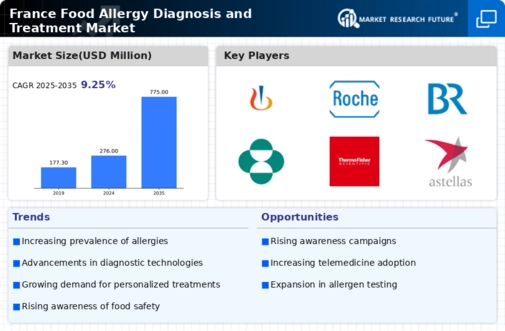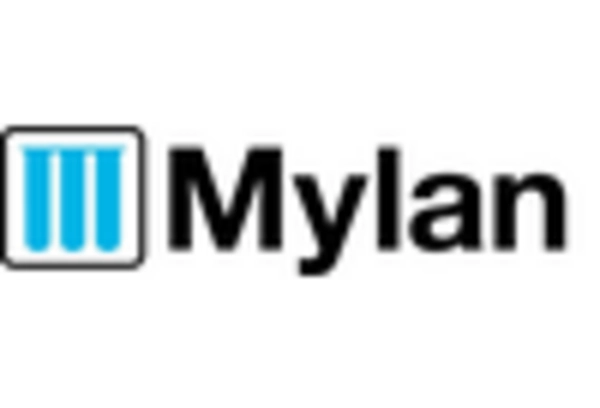Increased Awareness and Education
There is a growing awareness and education regarding food allergies among the French population, which serves as a significant driver for the food allergy-diagnosis-treatment market. Public health campaigns and educational programs have been instrumental in informing individuals about the risks associated with food allergies and the importance of early diagnosis. This heightened awareness encourages individuals to seek medical advice and diagnostic testing, thereby increasing the demand for services within the market. Additionally, healthcare providers are becoming more proactive in educating patients about food allergies, leading to a more informed public that is likely to pursue appropriate treatment options. Consequently, the food allergy-diagnosis-treatment market is expected to expand as more individuals recognize the need for effective management strategies and seek professional guidance.
Rising Prevalence of Food Allergies
The increasing incidence of food allergies in France is a primary driver for the food allergy-diagnosis-treatment market. Recent studies indicate that approximately 3-4% of the French population suffers from food allergies, with a notable rise in allergies to peanuts, tree nuts, and shellfish. This growing prevalence necessitates enhanced diagnostic testing and treatment options, as healthcare providers seek to address the needs of affected individuals. The food allergy diagnosis and treatment market is thus experiencing heightened demand for innovative solutions. This includes skin prick tests and specific IgE testing, which are essential for accurate diagnosis. Furthermore, the rising awareness among parents and caregivers about food allergies contributes to the market's expansion, as they actively seek reliable diagnostic methods and effective treatment plans to manage their children's health.
Advancements in Diagnostic Technologies
Technological innovations in diagnostic tools are significantly influencing the food allergy-diagnosis-treatment market. The introduction of advanced testing methods, such as component-resolved diagnostics and molecular allergology, allows for more precise identification of allergens. These advancements enhance the accuracy of diagnoses, which is crucial for effective management of food allergies. In France, the market is witnessing a shift towards these sophisticated technologies, as healthcare professionals increasingly adopt them to improve patient outcomes. The integration of digital health solutions, including mobile applications for tracking allergic reactions and dietary management, further supports this trend. As a result, The food allergy diagnosis and treatment market is likely to grow. This growth is driven by the demand for reliable and efficient diagnostic tools that can cater to the diverse needs of patients.
Growing Demand for Personalized Nutrition
The trend towards personalized nutrition is emerging as a key driver for the food allergy-diagnosis-treatment market. As consumers in France become more health-conscious, there is an increasing interest in tailored dietary solutions that cater to individual allergy profiles. This shift is prompting healthcare professionals to develop personalized treatment plans that consider specific food allergies and sensitivities. The food allergy-diagnosis-treatment market is responding to this demand by offering customized dietary recommendations and allergen-free products that align with patients' needs. Additionally, the rise of food technology companies focusing on allergen-free alternatives further supports this trend. As personalized nutrition continues to gain traction, the food allergy-diagnosis-treatment market is likely to experience growth, driven by the desire for effective and individualized management of food allergies.
Regulatory Support for Allergy Management
Regulatory frameworks in France are increasingly supporting the food allergy-diagnosis-treatment market, which is crucial for ensuring safety and efficacy in allergy management. The French government, along with health authorities, has implemented guidelines that promote best practices in diagnosing and treating food allergies. These regulations encourage the development and approval of new diagnostic tests and treatment modalities, fostering innovation within the market. Furthermore, the emphasis on patient safety and the need for standardized protocols contribute to the overall growth of the food allergy-diagnosis-treatment market. As regulatory bodies continue to prioritize allergy management, healthcare providers are more likely to adopt new technologies and treatment options, ultimately benefiting patients and enhancing market dynamics.
















